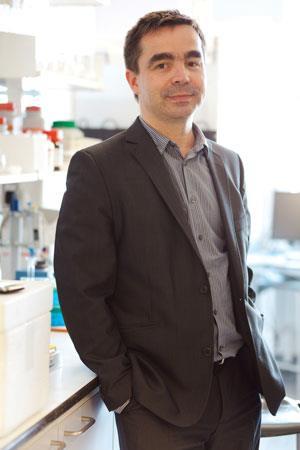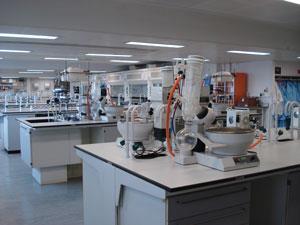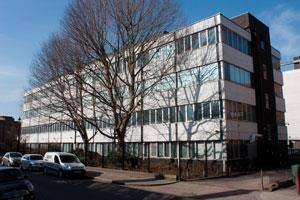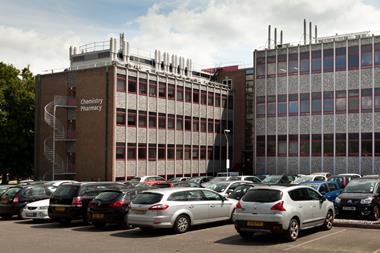Over the past few years, at least six UK universities have either opened or re-opened a chemistry department. Kathryn Roberts reports
Why chemistry is going through a revival probably comes down to a combination of several factors, says Neil Bricklebank, professional lead for chemistry at Sheffield Hallam University in the UK, which re-opened its chemistry department in 2011. The university had been forced to close chemistry in 2002, because poor student numbers made the department no longer financially viable.
‘The country’s poor economy, coupled with the introduction of tuition fees and a general media backlash against “soft” A-levels and degrees has stepped up the pressure on students to study more “credible” subjects,’ he says. That chemistry suffered a poor image in the past because it was perceived as being hard now seems to be working in its favour. For hard, now read rigorous, high quality or even better job prospects, explains Bricklebank. And inevitably, as student numbers decline in one subject, universities are looking to invest where they think they will be able to attract more students.
But there are other driving forces that determine the launch or re-launch of a department. Chemistry is back at King’s College London. In September 2012, King’s welcomed the first undergraduates onto its newly launched BSc/MSci in chemistry with biomedicine. The motivation for this development came predominantly from academics who reasoned that a university which claims to be offering broad science-based education, or has a school of natural sciences, makes no sense without chemistry.
Gerd Wagner, reader in medicinal chemistry and programme director of the new course at King’s, explains: ‘A university that has a portfolio of teaching programmes which aims to provide an understanding of the world at the molecular level without a chemistry programme has a gaping hole in its provision.’
Renaissance or reinvention?

One could argue that chemistry never left King’s – around 35 chemists work in other divisions, such as pharmaceutical science or medical imaging. But Wagner says this only helped them to make a stronger case for having a formal centre to bring the various chemical activities together.
Wagner and his colleagues are not alone in thinking that chemistry is part of the necessary fabric of a high-quality science section. Peter Fielden, head of chemistry at Lancaster University comments that senior academics very quickly regretted the university’s decision to close chemistry in the late 1990s. ‘A university that prides itself as being research-led, but which does not have a chemistry department, has a critical deficiency. I think this was the main driving force for senior academics to take a collective vision to bring chemistry back to Lancaster.’
The vice-chancellor of Wolverhampton University, Geoff Layer, went further and suggested that ‘to be considered as a university, a higher education institute should offer chemistry and physics degrees’. From this October, Wolverhampton will offer a BSc in chemistry for the first time in more than 10 years, and is planning to launch a BSc in physics in 2015.
But like it or not, says Fielden, universities are also businesses and have to be run in a sustainable way. He says that an upturn in student interest in A-level chemistry and the physical sciences in recent years has fuelled this renaissance.
It also makes sense to employ young talent looking to grow their own research groups
Peter Fielden
The new chemistry departments have all started with relatively small numbers of students, but they all promise to provide a chemistry programme that is expected to meet the accreditation requirements of the Royal Society of Chemistry.
There are several defining criteria that the RSC looks for in accrediting a chemistry course, including breadth and depth of chemistry, a specified number of practical hours, a research project, rigorous assessment, transferable skills and the resources to deliver the appropriate student experience. ‘The accreditation process assesses whether students get the opportunity to apply their knowledge to solve problems,’ says David Barr, head of membership and professional practice at the RSC. ‘Accreditation is there to serve the needs of employers, not universities.’
In relation to the current trend, Barr is upbeat. ‘We are seeing a variety of different chemistry courses today, which is good not only because it shows there is more than one way to teach chemistry, but also because it serves different types of student. There is also more emphasis today on developing student skills, and most universities today offer industrial placements, which are proving very popular with the students’.
Cutting boundaries not corners
Lancaster, having drawn up its business plan in 2011 with generous funding for staff and a building programme, appointed Fielden as head of department in October 2012. The first intake of 22 students on the BSc/MChem programme started a year later. The original chemistry building was not fit for purpose, so is being refurbished at a cost to the university of around £22 million. Fielden has already recruited 13 chemists, including two members of staff from the old era who had stayed on to support the teaching of natural sciences. The majority of the new recruits are ‘unashamedly’ from top chemistry departments in the Russell Group, he says, with several at the early stage of their careers. ‘Not only do we have to deliver teaching but we have to be a research-directed department, so it also makes sense to employ young talent looking to grow their own research groups.’ By 2017, he expects to have around 30 academic staff and an intake of around 60 undergraduates per year.

Fielden has a background in analytical science – he spent many years first at the University of Manchester Institute of Science and Technology and then at the University of Manchester– and he has a track record of working with many different disciplines, from engineering and physics through biological sciences to medicine, as well as with industrial partners. Part of his remit is to build links with the various chemists who moved into other departments when chemistry closed. His aim is to encourage interdisciplinary research and teaching. ‘Something I am particularly keen to do is break down the traditional inorganic, organic and physical chemistry silos in order to develop an integrated approach to teaching,’ he says.
‘We want to show our students that chemistry is not compartmentalised but is a spectrum across which they can move freely; they need to be able to communicate with people from all areas of chemistry and science to work successfully and to bring traditionally disparate ideas together,’ Fielden adds.
This is particularly important in the north-west of England, he explains, because there are over 800 companies that use chemistry in some form or other. These employ around 460,000 people and have an annual turnover in excess of £9 billion, 80% of which is from exports. So Fielden has his sights set on developing links with this industry, not only to give the students opportunities for work placements but also to encourage industry to see the university as a potential resource. ‘We don’t want to become an entirely applied chemistry department, but it is certainly going to be an important element, especially since “impact” will play a part in research funding,’ he says.
Specifically, Fielden is interested in homing in on niche areas where a small department can make a genuine contribution at an internationally competitive level. He has identified computational chemistry as one area for development, and this is being built into the undergraduate course.
Long live King’s chemistry
King’s has taken a different approach. Instead of starting from scratch, the ‘founding’ academics – Wagner and trained chemists Phil Blower and Roger Morris– began by inviting chemists in other divisions in the college to get involved in the planning of a new ‘chemistry with biomedicine’ programme, which they envisaged would lead on to the development of a full chemistry department. ‘We wanted to exploit the existing strengths of King’s in biomedical sciences to create something new,’ explains Wagner. ‘Having excellent facilities for chemistry research, as well as a modern chemistry teaching laboratory already in place was a bonus, as was the ability to use the college’s existing organisational structure to arrange open days.’
In the autumn of 2011, around 10 chemists, as well as doing their ‘day jobs’ in their respective departments, put in the extra hours to plan the structure, content and assessment of the various modules for the new four-year programme for internal approval by the university. Wagner and his colleagues also discussed the content with the RSC to ensure that they were on track for an accredited chemistry degree programme.

By the end of the year, with financial support from the university, they had started recruiting new staff to what at this stage was still a ‘virtual’ chemistry department. Since then, the department has grown to nine full-time academic staff, and five appointments have been made to positions that provide technical and administrative support. This core chemistry team is complemented by several joint appointments with other divisions. Crucially, Wagner explains, the first full-time chemistry appointment, Alice Collier, was a teaching fellow whose main aim was to design the practicals for the first two years and to look into the teaching aspects of the new programme.
The result is one of their most distinctive features. For years one and two, the department will run one integrated laboratory rather than separate ones for inorganic, physical and organic chemistry. ‘We have designed the experiments in a way that there are a few components from the different branches of chemistry in each, and often include biomedical examples,’ Wagner explains. ‘We want the students to appreciate that while you can discriminate between the branches, chemistry is increasingly done across these boundaries and with other disciplines.’
The course itself covers a broad range of teaching and training in the traditional branches of chemistry and where possible the fundamental principles are taught using biological and medical examples. ‘The hallmark of what we are trying to do is to link the chemistry to what people in medicine and pharmacy are doing, to give students a sense that translation is important,’ says Wagner. ‘This is a strength at King’s – the chemistry department is not isolated and people can work with colleagues in other departments.’

The chemistry programme at King’s is up and running, and Paula Booth, recruited from the University of Bristol’s school of biochemistry, has recently been appointed the head of what is now a very real chemistry department based in the School of Natural and Mathematical Sciences. This four-storey building was acquired by King’s in 2013 and is seen as a demonstration of its commitment to the future of chemistry.
Enhanced employability
With prestigious chemistry departments in the neighbourhood, Wagner believes it is important to give their students something that will open up opportunities to them in the job market. He points to a recent article in Nature Biotechnology which revealed that chemistry graduates were the most sought after – ahead of medicinal scientists, biologists, microbiologists and engineers – in the US life sciences industry, which includes biotechnology. The links to biomedicine in its new degree should, he says, give their students an edge in this growing industry.
Sheffield Hallam is also making use of its existing chemists and facilities to teach its new BSc chemistry programme, which is aimed at students who want to study chemistry in an applied context and has a strong analytical flavour. The new ‘biosciences and chemistry’ department also launched a one-year taught masters in analytical chemistry at the same time, which has already been accredited by the RSC.
Undergraduate numbers in chemistry are up by around 33% since the early 2000s
David Barr
‘This should bode well for the MChem programme, which is being developed for launch in 2015,’ says Bricklebank. One of the distinctive features of the course is the lab programme which, like that offered at King’s, integrates the traditional disciplines but has a problem-based approach, and makes use of an impressive range of modern instrumentation. ‘From year one, our students will be using a range of core analytical techniques. The students are also encouraged to take an optional industrial placement year. ‘
According to Bricklebank, ‘There is always going to be a place in the UK for large chemistry departments that are research active. But what is more important is the re-emergence of chemistry as a degree discipline. We need chemists and we need variety. We also have to encourage people to study chemistry even when we know they are not necessarily going to use their degree when they graduate. Having people who are chemically literate and have a good knowledge of the chemical sciences is good for the economy · analytical and problem-solving skills are useful whatever career they go into.’
This is an exciting time for chemistry, concludes Barr. ‘Undergraduate numbers in chemistry are up by around 33% since the early 2000s, and most of the established chemistry departments are at bursting point in terms of student numbers – it is a real opportunity for new departments to address a real need.’
Kathryn Roberts is a science writer based in London, UK
Interdisciplinarity – The key to success?
Just over 50 years ago, in the early 1960s, the University of Sussex was one of the first of the ‘new’ universities, and was innovative at the time in adopting a structure based on a schools system, rather than the departmental system. The university wanted to do something different and took the decision to move away from the traditional disciplines and boundaries within and between subjects, towards an interdisciplinary approach to both teaching and research.
A School of Molecular Sciences was launched in which chemistry was the central subject, but later other subjects were introduced, such as chemical physics, environmental science and materials science. Emeritus professor of chemistry at Sussex John Murrell explains, ‘The feeling at the time was that growth areas in chemistry were going to be at the boundaries, not only between inorganic, organic and physical chemistry but also between chemistry and other disciplines, and an interdisciplinary approach would provide a more relevant student experience.’
Murrell, then a young professor in the new school, and his colleagues set about designing a variety of courses. It was a time to experiment and be adventurous, he says. So while some of the courses they delivered were straight inorganic, organic or physical chemistry, others overlapped all three branches. They also tried different approaches to teaching. For example, they ran weekly ‘crash courses’ – with all the timetabled lectures, seminars and tutorials assigned to just one subject, something today’s ‘standardised’ approach would not really allow, he says. ‘We wanted to show students that they needed to be able to think and solve problems that spanned all three areas of chemistry.’
In research, too, the academics ensured that researchers from the different branches of chemistry worked in the same laboratories. ‘We were trying to be interdisciplinary and do something different,’ he emphasises.
Today, the schools system remains at Sussex, but now chemistry is part of the School of Life Sciences. ‘Chemistry is an enabling subject and its overlap with medicine and the biological sciences is now seen as vital to the continued success of Sussex’s graduates,’ Murrell says.












No comments yet